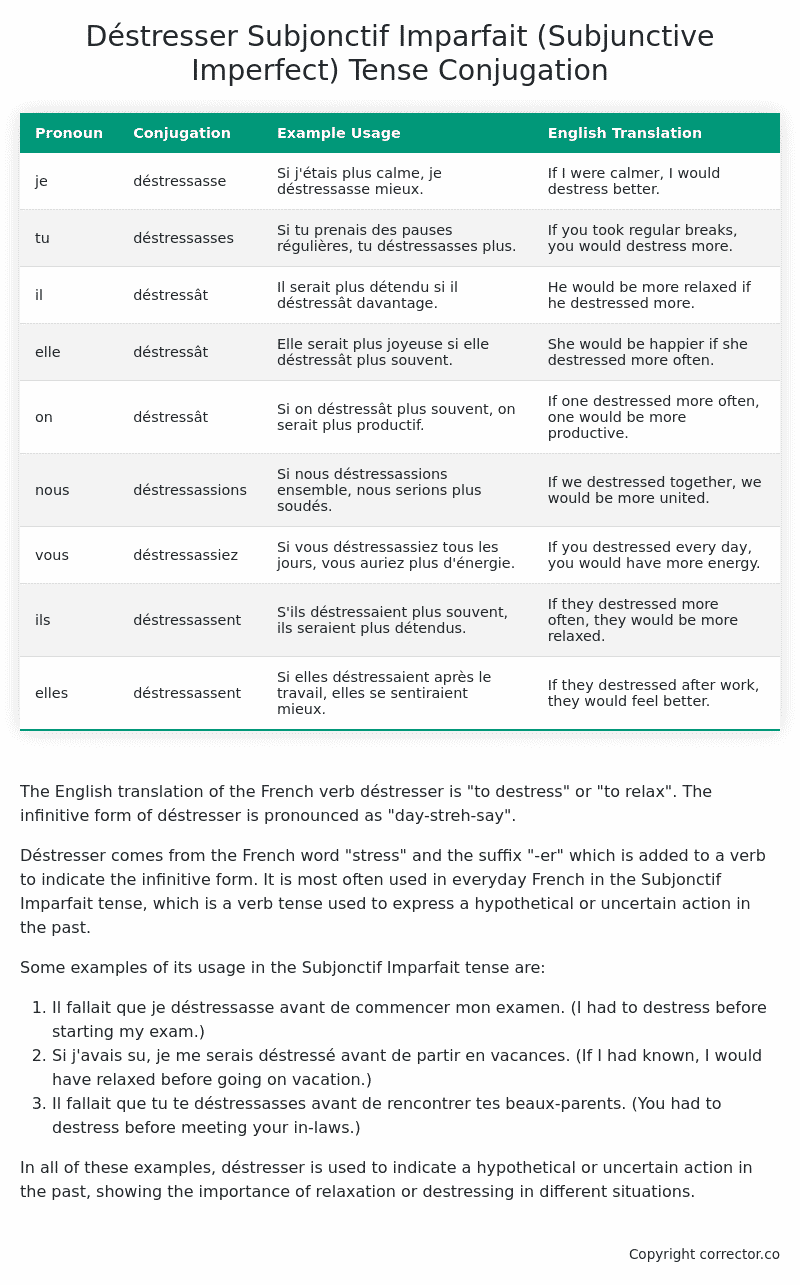Subjonctif Imparfait (Subjunctive Imperfect) Tense Conjugation of the French Verb déstresser
Introduction to the verb déstresser
The English translation of the French verb déstresser is “to destress” or “to relax”. The infinitive form of déstresser is pronounced as “day-streh-say”.
Déstresser comes from the French word “stress” and the suffix “-er” which is added to a verb to indicate the infinitive form. It is most often used in everyday French in the Subjonctif Imparfait tense, which is a verb tense used to express a hypothetical or uncertain action in the past.
Some examples of its usage in the Subjonctif Imparfait tense are:
- Il fallait que je déstressasse avant de commencer mon examen. (I had to destress before starting my exam.)
- Si j’avais su, je me serais déstressé avant de partir en vacances. (If I had known, I would have relaxed before going on vacation.)
- Il fallait que tu te déstressasses avant de rencontrer tes beaux-parents. (You had to destress before meeting your in-laws.)
In all of these examples, déstresser is used to indicate a hypothetical or uncertain action in the past, showing the importance of relaxation or destressing in different situations.
Table of the Subjonctif Imparfait (Subjunctive Imperfect) Tense Conjugation of déstresser
| Pronoun | Conjugation | Example Usage | English Translation |
|---|---|---|---|
| je | déstressasse | Si j’étais plus calme, je déstressasse mieux. | If I were calmer, I would destress better. |
| tu | déstressasses | Si tu prenais des pauses régulières, tu déstressasses plus. | If you took regular breaks, you would destress more. |
| il | déstressât | Il serait plus détendu si il déstressât davantage. | He would be more relaxed if he destressed more. |
| elle | déstressât | Elle serait plus joyeuse si elle déstressât plus souvent. | She would be happier if she destressed more often. |
| on | déstressât | Si on déstressât plus souvent, on serait plus productif. | If one destressed more often, one would be more productive. |
| nous | déstressassions | Si nous déstressassions ensemble, nous serions plus soudés. | If we destressed together, we would be more united. |
| vous | déstressassiez | Si vous déstressassiez tous les jours, vous auriez plus d’énergie. | If you destressed every day, you would have more energy. |
| ils | déstressassent | S’ils déstressaient plus souvent, ils seraient plus détendus. | If they destressed more often, they would be more relaxed. |
| elles | déstressassent | Si elles déstressaient après le travail, elles se sentiraient mieux. | If they destressed after work, they would feel better. |
Other Conjugations for Déstresser.
Le Present (Present Tense) Conjugation of the French Verb déstresser
Imparfait (Imperfect) Tense Conjugation of the French Verb déstresser
Passé Simple (Simple Past) Tense Conjugation of the French Verb déstresser
Passé Composé (Present Perfect) Tense Conjugation of the French Verb déstresser
Futur Simple (Simple Future) Tense Conjugation of the French Verb déstresser
Futur Proche (Near Future) Tense Conjugation of the French Verb déstresser
Plus-que-parfait (Pluperfect) Tense Conjugation of the French Verb déstresser
Passé Antérieur (Past Anterior) Tense Conjugation of the French Verb déstresser
Futur Antérieur (Future Anterior) Tense Conjugation of the French Verb déstresser
Subjonctif Présent (Subjunctive Present) Tense Conjugation of the French Verb déstresser
Subjonctif Passé (Subjunctive Past) Tense Conjugation of the French Verb déstresser
Subjonctif Imparfait (Subjunctive Imperfect) Tense Conjugation of the French Verb déstresser (this article)
Subjonctif Plus-que-parfait (Subjunctive Pluperfect) Tense Conjugation of the French Verb déstresser
Conditionnel Présent (Conditional Present) Tense Conjugation of the French Verb déstresser
Conditionnel Passé (Conditional Past) Tense Conjugation of the French Verb déstresser
L’impératif Présent (Imperative Present) Tense Conjugation of the French Verb déstresser
L’infinitif Présent (Infinitive Present) Tense Conjugation of the French Verb déstresser
Struggling with French verbs or the language in general? Why not use our free French Grammar Checker – no registration required!
Get a FREE Download Study Sheet of this Conjugation 🔥
Simply right click the image below, click “save image” and get your free reference for the déstresser Subjonctif Imparfait tense conjugation!

Déstresser – About the French Subjonctif Imparfait (Subjunctive Imperfect) Tense
Formation
Common Everyday Usage Patterns
Interactions with Other Tenses
Subjonctif Présent
Indicatif Passé Composé
Conditional
Conditional Perfect
Summary
I hope you enjoyed this article on the verb déstresser. Still in a learning mood? Check out another TOTALLY random French verb conjugation!


